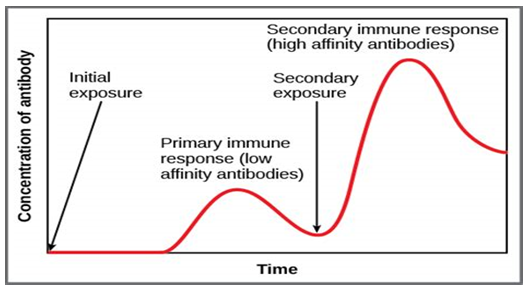Immunity develops either naturally by infection with a foreign antigen, or artificially by vaccination.
On initial exposure to the foreign antigen, the production of antibodies develops over several days. On a 2nd exposure to the same antigen, the response is quicker as memory cells respond rapidly to produce the antibodies.

Adaptive immunity is provided by T and B cells:
- T-Cells (cell mediated immunity)
- Activated by the antigen presenting cells
- Differentiate into
- T-Helper cells – activates B-cells
- T-Cytotoxic cells – Bind to and kill the foreign cells with the specific antigen
- T-Suppressor cells – Deactivate the cells once the goal has been achieved
- T-Memory cells - Remain in the body to react quickly on 2nd exposure to the antigen
- B-Cells (humoral immunity)
- Initial activation by T-Helper cells
- Produce antibodies to specific antigen
- Continual differentiation of B-Cells into either
- Memory cells (long lived)
- Plasma cells (short lived)
- Initial activation by T-Helper cells
Passive Immunity: This can be provided by the introduction of ‘ready made’ antibodies e.g. antibodies crossing the placenta to protect a new born body. This protection is immediate but only short-term. It doesn’t activate the immune response to produce an immunological memory.
For further information on Adaptive immunity you can watch the below videos:
